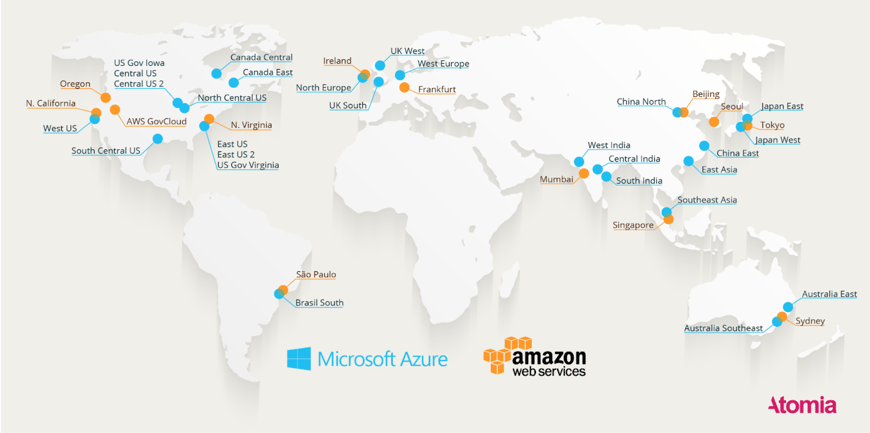
Most cloud call center solutions depend on a specific cloud infrastructure provider or a proprietary data center. Many vendors rely on large providers like Microsoft and Amazon to provide a global reach. The reality of working in the cloud, however, is that no business can operate on a global level when its chosen cloud platform doesn’t.Unfortunately, the cloud hasn’t reached many parts of the world. As such, no cloud infrastructure provider enjoys global coverage. Consider the Atomia map shown, which plots the regions served by Microsoft Azure and Amazon Web Services (AWS). It shows vast blank spaces in which there is no cloud coverage at all. Remove Azure presence points and the map looks even more sparse.
It’s no surprise that Azure reaches more places than AWS. According to Forbes, in 2017, Microsoft beat all other enterprise cloud vendors in revenue at $18.6 billion, with Amazon trailing at $17.5 billion and IBM at $17 billion. Next in line were Salesforce, Oracle, SAP, and Google, all at under $10 billion.
In order to provide a global contact center, your solutions should be optimized to work for any cloud service market, particularly those that can provide reach and cost-effective services, thanks to their size. If your solutions work with the top revenue rulers of the cloud, for example, your reach should be as close to global as is possible for the time being. If you omit any of them, you’re only limiting yourself.
Reliance on a single vendor for mission-critical applications is also risky, as AWS S3 disruption or Azure fire extinguisher mishap illustrate all too well.
Solutions that work for any cloud will have the clear advantage.
This is why we decided at Bright Pattern to build our cloud call center software to be cloud-agnostic from day one. It was a hard choice. We could have released our first product faster by maximizing our usage of a single platform, but we didn’t. This is important to note because adding support later would have added complexity to our product. We are running in Amazon, Azure, Rackspace, and other clouds and their combinations, allowing us to serve customers around the globe, including the white areas of the map shown, like Johannesburg, South Africa. Check here to learn more about key considerations.

